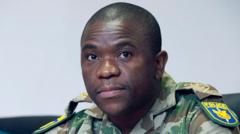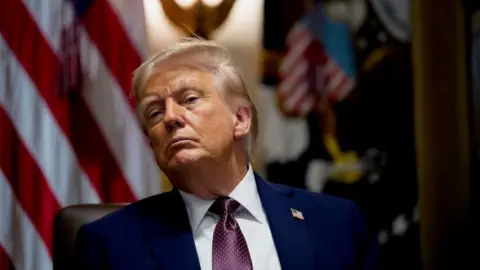General Mkhwanazi, clad in a military uniform, conducted the press briefing with masked officers by his side, proclaiming a commitment to combat crime directly. He alleges that Mchunu has obstructed an elite investigative unit that was probing links between political figures and criminal syndicates, particularly following the discovery of a drug cartel affecting various sectors, including business and law enforcement.
Mchunu quickly dismissed Mkhwanazi's assertions as unfounded, stating that he was ready to counter the accusations. The response from the public, however, was overwhelmingly supportive of Mkhwanazi, particularly on social media, reflecting widespread discontent with corruption in the police force, which has seen trust ratings plummet over the years.
Garnering a reputation as a fearless officer, Mkhwanazi previously gained public respect for suspending a corrupt crime intelligence chief, highlighting his unwillingness to conform to political manipulation. Following the disbandment of an investigative unit that had accumulated numerous unsolved cases, he declared his resolve to uphold the badge of the South African Police.
Despite mixed reviews of his leadership approach—particularly relating to aggressive tactics against suspects—public sentiment appears to back Mkhwanazi in his pursuit of accountability. His allegations come against a backdrop of widespread systemic issues, including high crime rates and political interference plaguing South Africa’s policing system.
As the situation unfolds, with a new acting police minister set to take charge next month, Mkhwanazi’s future and the integrity of his claims will be pivotal. Should his accusations hold true, they could radically alter the landscape of South Africa's fight against organized crime. For now, he stands as a symbol of resistance against perceived corruption within the government.
Mchunu quickly dismissed Mkhwanazi's assertions as unfounded, stating that he was ready to counter the accusations. The response from the public, however, was overwhelmingly supportive of Mkhwanazi, particularly on social media, reflecting widespread discontent with corruption in the police force, which has seen trust ratings plummet over the years.
Garnering a reputation as a fearless officer, Mkhwanazi previously gained public respect for suspending a corrupt crime intelligence chief, highlighting his unwillingness to conform to political manipulation. Following the disbandment of an investigative unit that had accumulated numerous unsolved cases, he declared his resolve to uphold the badge of the South African Police.
Despite mixed reviews of his leadership approach—particularly relating to aggressive tactics against suspects—public sentiment appears to back Mkhwanazi in his pursuit of accountability. His allegations come against a backdrop of widespread systemic issues, including high crime rates and political interference plaguing South Africa’s policing system.
As the situation unfolds, with a new acting police minister set to take charge next month, Mkhwanazi’s future and the integrity of his claims will be pivotal. Should his accusations hold true, they could radically alter the landscape of South Africa's fight against organized crime. For now, he stands as a symbol of resistance against perceived corruption within the government.





















